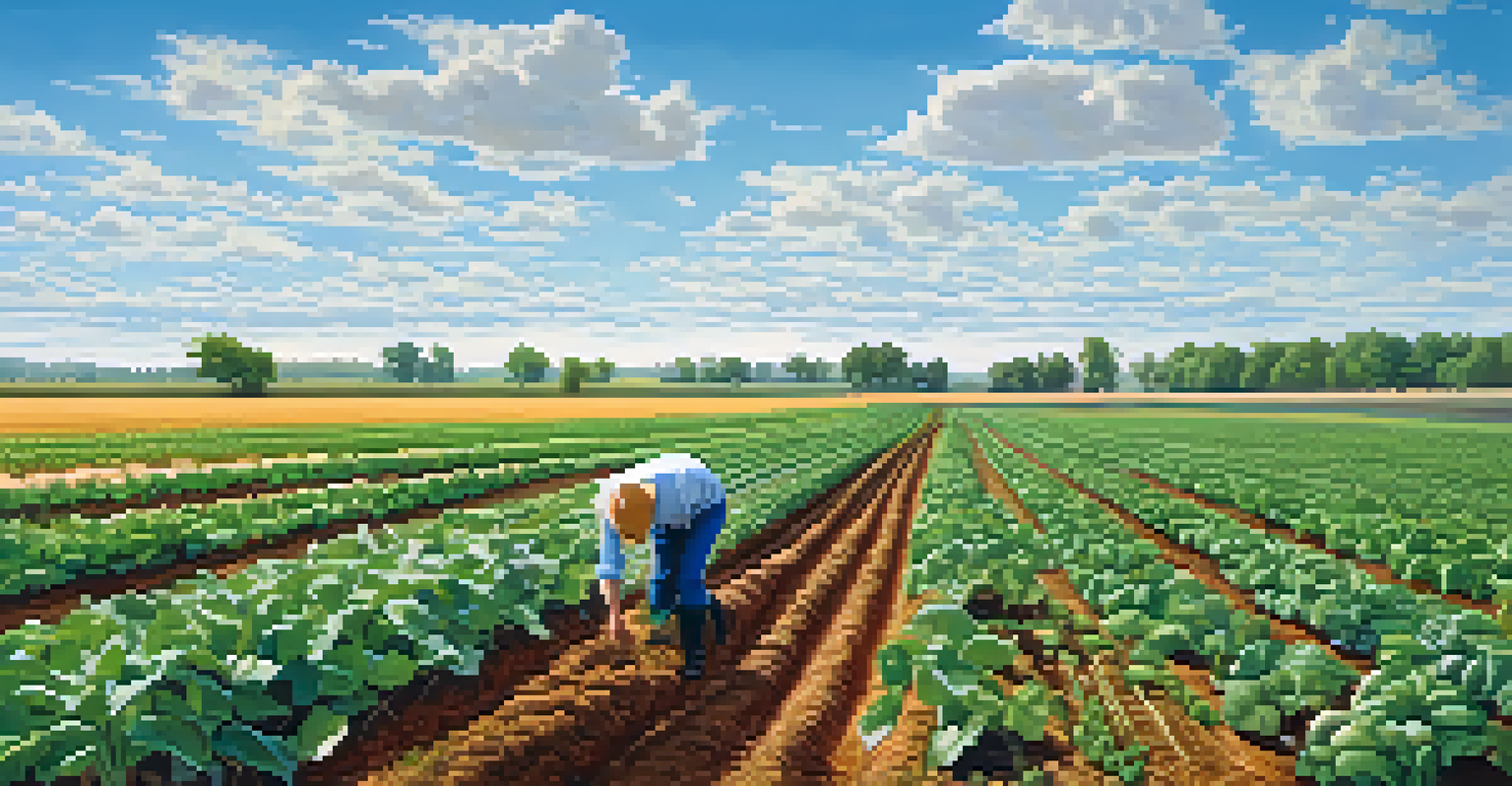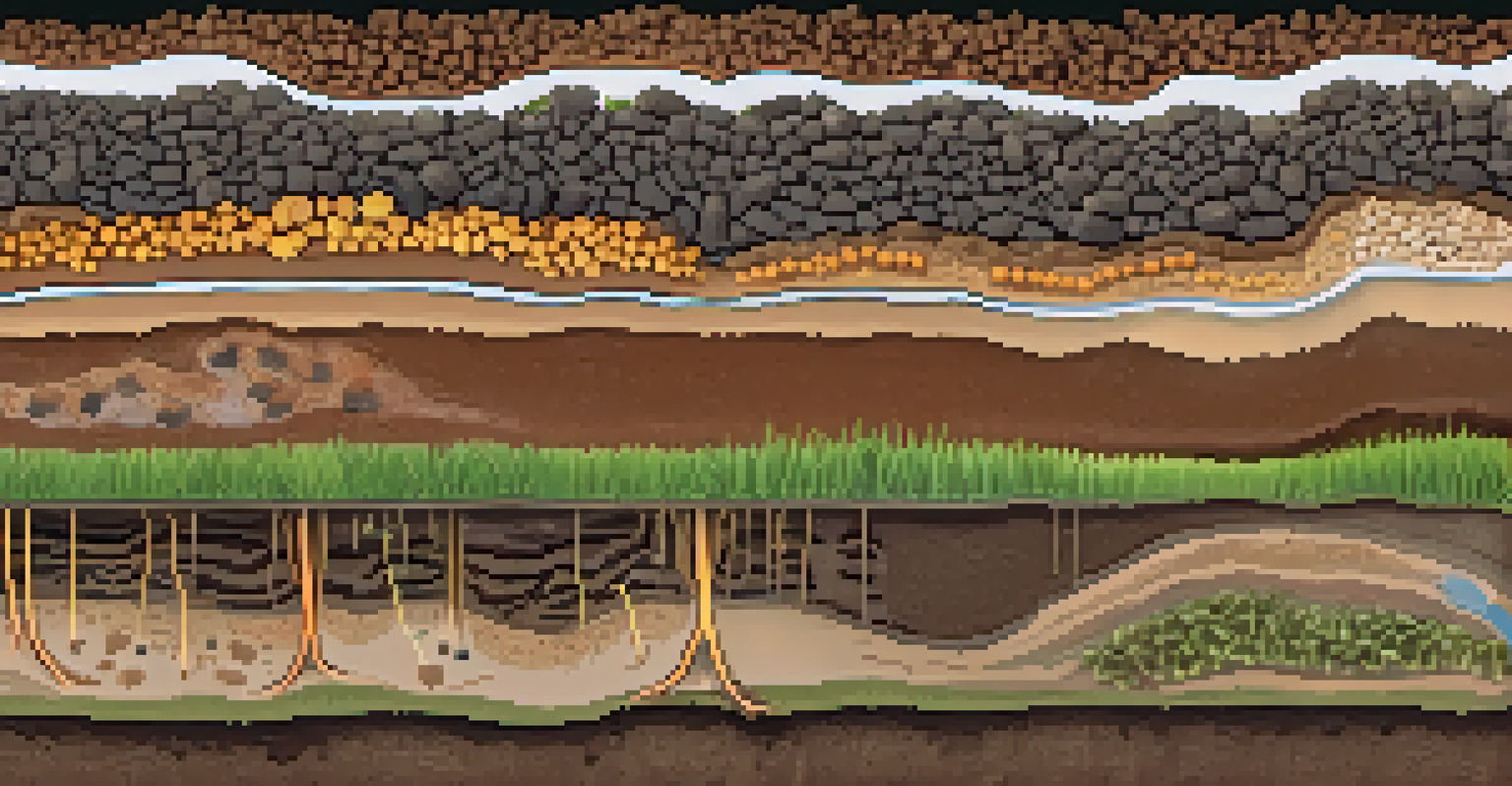The Role of Mycorrhizal Fungi in Sustainable Agriculture

Understanding Mycorrhizal Fungi and Their Benefits
Mycorrhizal fungi are fascinating organisms that form symbiotic relationships with plant roots. By connecting with the plant's root system, these fungi enhance nutrient uptake, particularly phosphorus, which is essential for plant growth. This relationship is not just beneficial for plants; it also improves soil health, promoting a balanced ecosystem.
The soil is alive, and it’s the fungi that connect the different components of that life.
These fungi can expand the root system's reach by many times, allowing plants to access nutrients and water from a larger volume of soil. This means that plants can thrive even in less-than-ideal soil conditions, which is especially important in sustainable agriculture. By reducing the need for chemical fertilizers, mycorrhizal fungi foster a more eco-friendly farming approach.
Furthermore, the presence of mycorrhizal fungi can help plants withstand environmental stresses, such as drought or disease. This resilience is vital for sustainable agriculture, as it can lead to increased crop yields and reduced reliance on chemical interventions, helping farmers maintain productivity while protecting the environment.
The Symbiotic Relationship Between Fungi and Plants
In the world of agriculture, the relationship between mycorrhizal fungi and plants is a classic example of mutualism, where both parties benefit. Plants provide the fungi with carbohydrates produced through photosynthesis, while the fungi supply essential nutrients and water. This exchange creates a thriving ecosystem beneath the soil surface, fostering plant health and growth.

This partnership is particularly beneficial in nutrient-poor soils where traditional fertilizers would be ineffective. When plants are connected to mycorrhizal networks, they are better equipped to absorb critical nutrients, reducing the need for chemical amendments that can harm the environment. This natural process encourages a more sustainable approach to farming.
Mycorrhizal Fungi Boost Plant Growth
These fungi enhance nutrient uptake and improve soil health, allowing plants to thrive even in challenging conditions.
Moreover, the establishment of these fungal networks can also promote biodiversity in the soil. A diverse microbial community enhances soil structure and resilience, allowing for better air and water retention, which is crucial for healthy crop development. Thus, the symbiotic relationship between mycorrhizal fungi and plants is a key player in sustainable agriculture.
Mycorrhizal Fungi's Role in Soil Health
Soil health is the foundation of successful agriculture, and mycorrhizal fungi play a significant role in maintaining it. These fungi contribute to soil structure by forming aggregates that improve aeration and water infiltration. This not only enhances root growth but also supports a diverse range of microorganisms essential for nutrient cycling.
Healthy soil is the foundation of sustainable agriculture, and mycorrhizal fungi are one of its key architects.
Additionally, mycorrhizal fungi help in the breakdown of organic matter, releasing nutrients back into the soil. This process not only nourishes plants but also reduces the need for chemical fertilizers, promoting a more sustainable farming practice. Healthy soil rich in mycorrhizal fungi is a treasure trove of life, leading to better crop yields.
Furthermore, healthy soils with active mycorrhizal populations are more resilient to erosion and degradation. This resilience is crucial as climate change poses new challenges to agriculture. By supporting soil health through the presence of mycorrhizal fungi, farmers can adapt to these challenges and contribute to sustainable farming practices.
Enhancing Crop Resilience Through Fungal Networks
Crop resilience is essential for sustainable agriculture, especially in the face of climate change. Mycorrhizal fungi enhance this resilience by improving water uptake and nutrient availability during adverse conditions. When plants are well-connected to these fungal networks, they can better cope with drought, salinity, and other stressors.
Studies have shown that crops associated with mycorrhizal fungi exhibit stronger growth and higher yields, even when water or nutrients are limited. This resilience translates into food security, as farmers can maintain productivity without over-relying on chemical inputs. By reducing the impact of environmental stressors, these fungi play an indispensable role in sustainable farming.
Symbiotic Relationships Enhance Soil
The mutual exchange between plants and mycorrhizal fungi promotes biodiversity, improves soil structure, and reduces reliance on chemical fertilizers.
Additionally, the increased biodiversity in mycorrhizal networks may also lead to improved pest and disease resistance. Healthier plants are less susceptible to diseases, which is a win-win situation for farmers seeking sustainable solutions. Therefore, enhancing crop resilience through mycorrhizal fungi is a strategic approach to sustainable agriculture.
Mycorrhizal Fungi and Organic Farming
Mycorrhizal fungi are particularly important in organic farming, where synthetic chemicals are avoided. Organic farmers rely on natural processes to enhance soil fertility and plant health, making these fungi indispensable allies. Their ability to improve nutrient uptake means that organic farmers can achieve healthier crops without resorting to chemical fertilizers.
In organic systems, the emphasis on building healthy soils aligns perfectly with the role of mycorrhizal fungi. As these fungi thrive in rich, organic soils, they help create a self-sustaining ecosystem that supports plant growth while preserving the environment. This synergy is a cornerstone of successful organic farming practices.
Moreover, incorporating mycorrhizal fungi into organic farming can lead to improved soil biodiversity and health. This approach not only enhances crop yields but also promotes sustainable land management practices that protect local ecosystems. By fostering this relationship, organic farmers can contribute to a more sustainable agricultural future.
Challenges Facing Mycorrhizal Fungi in Agriculture
Despite their benefits, mycorrhizal fungi face challenges in agricultural settings. Practices like monocropping, excessive tillage, and chemical inputs can disrupt these essential fungal networks. These practices can lead to lower populations of mycorrhizal fungi, reducing their effectiveness in supporting plant health and soil fertility.
Furthermore, the loss of biodiversity in agricultural landscapes can have a cascading effect on mycorrhizal fungi. As diverse plant species disappear, so too do the fungi that depend on them. This loss can weaken the resilience of the entire ecosystem, making it crucial for farmers to adopt practices that support both plant and fungal diversity.
Fungi Support Sustainable Agriculture
Mycorrhizal networks enhance crop resilience and food security while encouraging eco-friendly farming practices.
To combat these challenges, farmers can implement practices such as crop rotation, reduced tillage, and organic amendments. By fostering a more diverse and healthy soil ecosystem, farmers can enhance the populations of mycorrhizal fungi, ensuring that their benefits are realized in sustainable agriculture.
Future Perspectives on Mycorrhizal Fungi Research
Research into mycorrhizal fungi is still evolving, and many exciting discoveries are on the horizon. Scientists are exploring how different fungal species interact with various crops, aiming to identify the best combinations for enhancing agricultural productivity. This research could lead to tailored solutions that maximize the benefits of these fungi in specific farming contexts.
Moreover, understanding the genetic makeup of mycorrhizal fungi can provide insights into how to improve their effectiveness in different soil types and environments. This knowledge can help farmers optimize their use of mycorrhizal fungi, leading to more sustainable farming practices that align with environmental goals.

As awareness grows about the importance of sustainable agriculture, mycorrhizal fungi research will play an increasingly vital role in shaping future agricultural practices. By integrating science with traditional farming methods, we can create a more resilient and sustainable agricultural system that benefits both farmers and the planet.